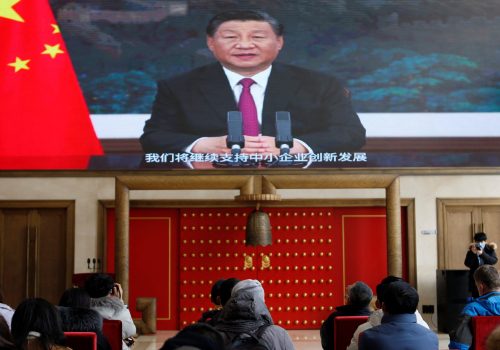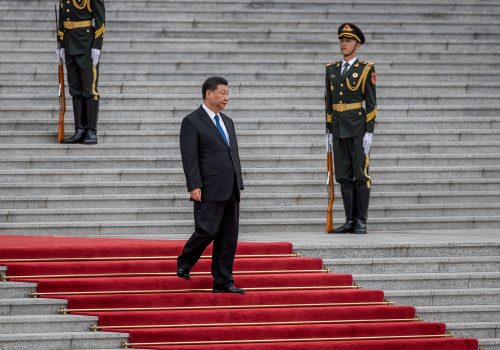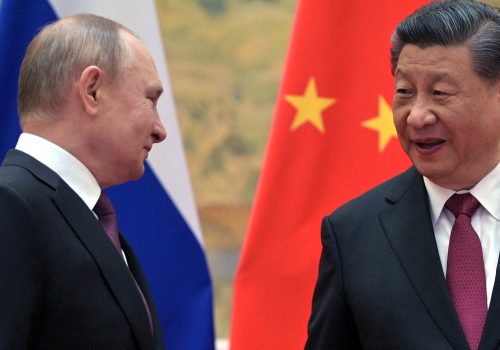FAST THINKING: What China stands to gain—and lose—by wading into the Ukraine war
GET AHEAD OF THE NEWS
How far will these autocrats take their “no limits” friendship? As Russian President Vladimir Putin’s war in Ukraine grinds on, the Kremlin has reportedly reached out to Beijing for some extra military muscle. Meanwhile, there’s chatter among foreign-policy thinkers in both China and the West that President Xi Jinping could play a uniquely useful role in mediating the conflict. So today we’re taking a different approach to our Fast Thinking alerts. Call it Fast Forward: Insight from our top Sinologists about China’s potential options for dealing with its combustible next-door neighbor.
TODAY’S EXPERT REACTION COURTESY OF
- David Shullman (@DaveShullman): Senior director of the Global China Hub and former US intelligence official focused on East Asia
- Dexter Tiff Roberts (@dtiffroberts): Senior fellow at the Scowcroft Center for Strategy and Security’s Asia Security Initiative and former China bureau chief for Bloomberg Businessweek
- John Culver (@JohnCulver689): Nonresident senior fellow at the Global China Hub and former national intelligence officer for East Asia
Man in the middle
- China’s leadership, David tells us, will attempt to squeeze itself out of a tight spot “by portraying Beijing as a responsible player willing to mediate the conflict and provide Putin an offramp rather than ‘fanning the flames’ of war,” as it accuses the United States of doing.
- He adds that Putin is a critical partner in China’s “deepening rivalry” with Washington—Beijing’s overriding geostrategic priority—which is why it’ll “pair its rhetorical claims to neutrality with financial assistance for Putin’s regime at levels deemed unlikely to draw a serious response” from the United States and NATO.
- This is all playing out against a backdrop of a high-stakes Communist Party Congress this fall where Xi plans to extend his rule, a new COVID-19 surge in China, and energy- and commodity-price uncertainty fueled by the war in Ukraine. Amid this great “strategic uncertainty,” John says, China continues to operate under the assumption “that the United States is an adversarial declining hegemon, Russia is the strategic partner, and they don’t know how this ends and can’t yet adjust.”
Subscribe to Fast Thinking email alerts
Sign up to receive rapid insight in your inbox from Atlantic Council experts on global events as they unfold.

The long game
- Dexter says that while he thinks the Chinese government was “deeply disturbed” by Putin’s invasion of Ukraine, “Beijing believes that Moscow is right to feel aggrieved.” That’s because Chinese officials see the NATO-Russia standoff as comparable to perceived US meddling in the Indo-Pacific.
- And that’s where Taiwan comes in. China’s leaders are wary of poking the bear, Dexter says, because “they hope to have Russia’s support, including at the UN if necessary, when they eventually move more forcefully to rein in Taiwan.”
- Besides, he adds, Beijing knows perfectly well that pressuring Putin won’t warm relations with Washington—whose perceived broader intent is “to stymie China’s rise.” That means “China’s role in any concerted peace effort is likely to be half-hearted, of limited value in affecting Russia’s behavior, and possibly even counterproductive,” Dexter tells us.
Taking notes
- Russia’s war in Ukraine is also instructive for the People’s Liberation Army (PLA), John says, as it maps out various military scenarios in Taiwan. The war in Eastern Europe will likely both confirm and challenge Chinese assumptions.
- China will be heartened, John says, to see that Russia’s status as a nuclear weapons power appears to have deterred the United States and NATO from escalating their involvement in the conflict, a trend that could extend to potential US intervention in Taiwan. Meanwhile, the Russian military’s stumbles and Ukrainian military’s surprisingly effective tactics provide further confirmation that “information dominance, drone [and] unmanned platforms, and integrated joint operations are keys to success in twenty-first century warfare.”
- But on the other hand, John says, “the PLA may need to reconsider Taiwan’s will and capacity to resist” any Chinese offensive after watching the fierce fight Ukraine’s military has put up. Similarly, he adds, Beijing might need to recalculate the potential economic costs of crossing the strait: “The speed and comprehensiveness of US-led economic sanctions against Russia must have been startling.”
Further reading
Wed, Feb 23, 2022
Today’s wars are fought in the ‘gray zone.’ Here’s everything you need to know about it.
Hybrid Conflict Project By
Our experts help illuminate this shadowy zone of strategic competition—and offer ways for Washington and its allies to begin seizing the advantage.
Wed, Feb 23, 2022
China and Russia are proposing a new authoritarian playbook. MENA leaders are watching closely.
MENASource By Ahmed Aboudouh
It’s on major Western democracies to make democracy appealing again by aggressively filling the gaps China and Russia exploit to make the world more accommodating to their political models and the new trend of rising authoritarianism.
Thu, Feb 10, 2022
What will China do if Russia escalates in Ukraine?
New Atlanticist By Katherine Walla
Former Australian Prime Minister Kevin Rudd and former US National Security Advisor Stephen Hadley tackled the big questions about the China-Russia partnership at an Atlantic Council event.
Image: Russian President Vladimir Putin meets with his Chinese counterpart Xi Jinping at the Kremlin in Moscow, Russia, on June 5, 2019. Photo via REUTERS/Evgenia Novozhenina/Pool.


